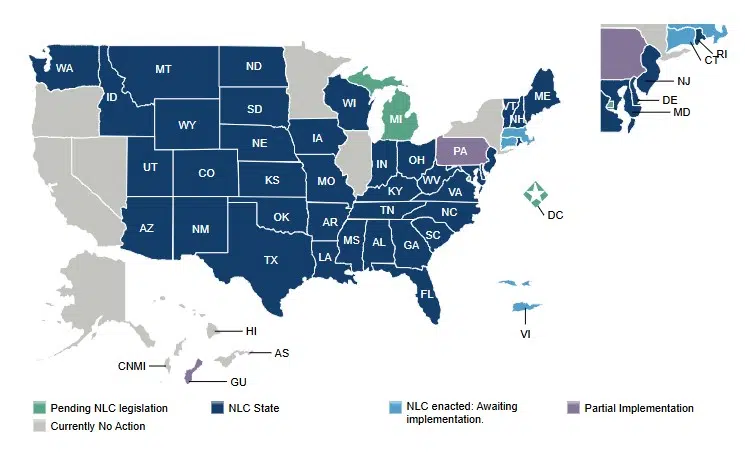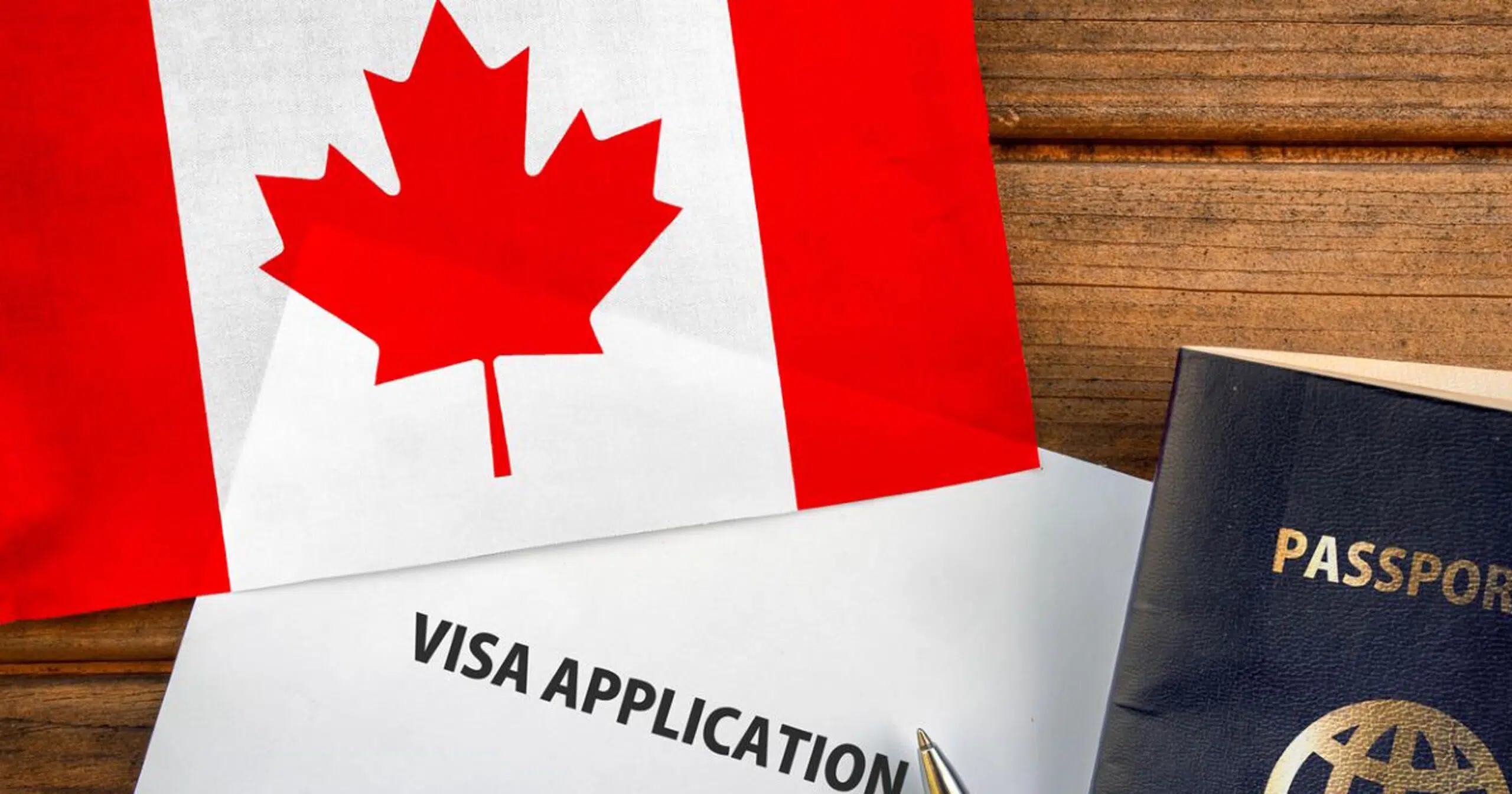Travel nursing offers a unique way to tackle staffing shortages. From a nurse’s perspective, it’s a great way to explore the country while making a good wage and utilizing your in-demand skills. The concept of travel nursing originated in the 1970s in New Orleans when additional nurses were brought in to accommodate the influx of visitors during Mardi Gras and the associated increase in hospital visits. By the 1980s, travel nursing had become a popular solution for healthcare facilities to address nursing shortages across the U.S.
Today, travel nursing is essential in American healthcare, helping facilities manage rising demands with short-term staffing solutions. Understanding the complexities of licensure can be challenging for traveling nurses. Vivian Health breaks down working across states, offering travel nurses tips for the licensure process and how to find the best route for their specific situations.
Guide to Obtaining a Travel Nurse License

Registered nurses (RNs) and licensed practical or vocational nurses (LPN/LVNs) can transfer their licenses from state to state. This ability benefits staff and travel nurses alike, but travel nurses often apply for and hold licenses in multiple states, making it more complicated. Although the process is fairly straightforward compared to other professions, it requires some organization and pre-planning.
The licensure process is simpler for residents of Compact states, allowing them to work in any state that is part of the enhanced Nursing Licensure Compact (eNLC) without needing to obtain an additional nursing license.
Many facilities require you to have a license in hand before applying for travel nurse jobs. Generally, agencies won’t submit you for a job until you hold a state-specific nursing license. Some may let you interview beforehand, but you often can’t sign a contract without obtaining an actual license.
When applying for nursing licenses, consider your other life plans to keep things on track. It’s a good idea to start the application process three months before you plan to begin applying for travel jobs. Every state may have slightly different travel nurse license requirements. For example, if California is on your list, consider giving yourself extra time—its Board of Nursing (BON) is known for its lengthy process and numerous licensing requirements.
RELATED: Travel Nursing FAQ: A Complete Guide
The 3 Types of Licenses Travel Nurses Can Obtain
Single State Nurse License
If you’re considering travel nursing, you likely already hold a nursing license in one state, as travel roles require at least two years of experience in your specialty. The easiest route to get licensed in another state is by endorsement. The process can take anywhere from 2 to 12 weeks, depending on the state and how organized you have your paperwork.
You need the BON from your licensed state to send verification directly to the board in the state where you’re applying. Many states use the Nursys database to quickly verify your existing nursing license. However, some states still prefer direct verification from the BON that issued your license. In addition to standard application fees, you’ll pay a $30 fee for Nursys verification. Some states may also require fingerprints, ID, employment verification and official school transcripts.
RELATED: Travel Nursing and Single State Licenses
Compact Travel Nurse License

The eNLC launched on January 19, 2018, and is a dream for travel nurses with a permanent address in a Compact state. It allows RNs and LPN/LVNs in member states who qualify for a multistate license to practice across other Compact states.
According to the National Council of State Boards of Nursing, 43 U.S. states or territories have passed legislation to join the eNLC as of November 2024. New graduates and current nurses can apply for a Compact (multistate) license through the BON in their primary state of residence, making it easier to work seamlessly across any fully implemented Compact state.
RELATED: What Are the Nurse Licensure Compact States?
Temporary Nursing License
Temporary licenses help travel nurses needing fast approval start working while waiting for full licensure. A temporary nursing license usually expires within six months, allowing nurses to work while the BON processes their permanent licensure applications. BONs commonly grant temporary licensure to:
- Nurses by Endorsement: Transferring an existing license from another state
- New Graduates: Working while awaiting NCLEX results
Some states issue temporary licenses within a few days for quick starts. Processing times and fees vary, so check with each state’s BON. Nurses typically need an active out-of-state license, ID and sometimes a background check. Temporary licenses are usually valid for 30 to 180 days, providing enough time to secure a permanent license, and they’re generally nonrenewable.
RELATED: How to Get a Temporary RN License in Every State
Special Considerations for International Nurses

If you’re an international nurse looking to become a travel nurse in the U.S., there are extra steps you must complete beyond state-specific BON licensing, including:
- No Access to Compact Licenses: Unlike U.S.-licensed nurses, international nurses don’t qualify for eNLC multistate licenses, so you must obtain separate licenses for each state.
- Licensing Requirements and Processes: You must pass the NCLEX-RN exam (if you haven’t already) and obtain VisaScreen certification and a credentials evaluation (CES report) from the Commission on Graduates of Foreign Nursing Schools to verify your education and experience. Most BONs also need fingerprinting, background checks, nursing transcripts and endorsement of your home country license.
- Visa and Immigration Needs: Securing the right visa, such as a TN visa, often requires a job offer from a U.S.-based employer and, typically, a social security number before you can start work. Be aware that you generally can’t arrive in the U.S. more than 10 days before your start date.
Working with a staffing agency and recruiter familiar with the steps required for international nurses can make this process more seamless. Allowing enough time to ensure each piece is in place will help you transition smoothly into a U.S. travel nursing career.
RELATED: 8 Steps Canadian Nurses Must Take to Work in the U.S.
Navigating Travel Nurse Licensing Challenges
Obtaining a travel nurse license can feel overwhelming and often confusing. Each state has different application methods, documentation requirements and background check/fingerprint rules to complete an application, making the process even more complicated.
Some states also have some confusing renewal rules. If you aren’t careful, your license could expire soon after you obtain it. You must always ensure your license will be valid for the dates you plan to work.
For example, the Washington state BON renews licenses according to birthdays and even/odd years. So, if you apply for that license too early, you may have to renew before you even start work if your birthday falls within the board’s criteria for renewal. Another example is Colorado. Its renewal rules are strict, but if you obtain a license within the 120-day period before your renewal is due, you’re exempt from having to reapply.
Renewing and Maintaining Multiple Licenses

Each state’s BON has its own rules for license renewal and continuing education (CE) credits, with varying timelines and requirements. Understanding licensing rules also includes renewing your license, so make sure you’re familiar with them.
Some states require annual renewals, others follow a two-year schedule and a few renew licenses around your birthday. For example, in Texas, licenses expire at the end of the nurse’s birth month in odd-numbered or even-numbered years. So, a new nurse’s first renewal might be due as soon as six months or as late as 29 months after licensing. After that, renewals generally happen every two years.
To avoid renewal delays or expiration, it’s essential to:
- Complete Prerequisite CE or Practice Requirements: Make sure your CE credits or practice hours are in order well in advance.
- Pay Required Fees: BONs won’t renew licenses until you pay all fees due.
To stay on top of renewal dates, CE hours and fees, try using a detailed spreadsheet, apps like CertAlert or set phone reminders. Nursys also offers a free e-service for license expiration and status updates. I also keep a photo album on my phone with pictures of all my certifications and licenses for quick access when I need to attach them to emails. These and other tools can simplify license management and prevent scrambling at the last minute.
Licensure Fees and Travel Nurse Agencies
Application fees for licensure vary from state to state. You also cover charges for fingerprints/background checks, license verification, official transcripts and possibly any additional education required. Plan for these payments in advance and avoid the hit to your bank account.
The good news is most staffing agencies reimburse you for the associated costs of obtaining a license. You can negotiate this with your recruiter, but it must be in your contract. However, you’re only reimbursed the fees for the state where you’re taking a contract. If your agency isn’t willing to reimburse you, it may be worth checking out other agencies to see if they help absorb the costs.
Save receipts and credit card or bank statements for all charges you incur. Take a picture or a screenshot as extra documentation in case you lose any paperwork.
Building a Sustainable Career in Travel Nursing
Every travel nurse dreams of a simple and affordable nationwide licensure system. While the eNLC is a massive step in the right direction, there’s room for improvement. Simplifying the process further and reducing the high application fees, background checks and verifications would be a game-changer for the profession.
Until then, staying proactive about licensing is essential for building a sustainable travel nursing career. By keeping an eye on updates—like new states joining the eNLC—and ensuring your licenses are up to date, you’re setting yourself up to transition smoothly from one assignment to the next. Expanding your license to new states is one of the first steps toward hitting the road.
Create a free Vivian Health account to stay on top of the latest job trends, connect directly with recruiters and agencies, and ensure you never miss out on top opportunities.









